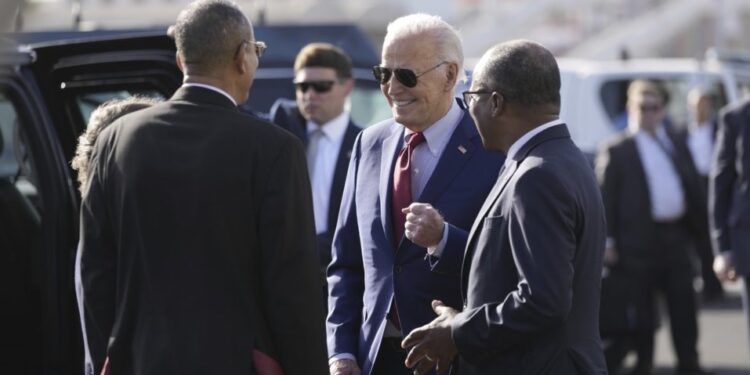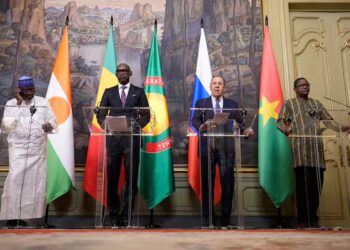By John Ikani
President Joe Biden has begun his first official visit to sub-Saharan Africa, arriving in Angola on Monday. Over the three-day trip, he aims to spotlight U.S. efforts to counter China’s influence, focusing on a major railway project in the region.
The Lobito Corridor, a key infrastructure plan, involves upgrading rail links across Angola, Zambia, and Congo. It is central to U.S. ambitions to secure access to critical minerals like cobalt and copper, vital components for electric vehicles and renewable technologies.
Biden’s first stop was Cape Verde, where he held a private meeting with Prime Minister Ulisses Correia e Silva. In Angola, his schedule includes talks with President João Lourenço, a visit to the National Slavery Museum, and an inspection of the Lobito Corridor project.
The visit takes place as Biden nears the end of his term, with Republican Donald Trump set to take office in January.
The president had promised to visit Africa during the U.S.-Africa Summit in 2022. However, the trip was delayed twice, once to 2024 and again in October due to Hurricane Milton, reinforcing concerns that Africa remains secondary in U.S. foreign policy priorities.
The last U.S. presidential visit to sub-Saharan Africa was by Barack Obama in 2015. Biden himself attended a climate summit in Egypt in 2022, marking his only prior official engagement on the continent.
“I just kind of push back on the premise that this is some Johnny-come-lately trip at the very end,” said National Security Spokesman John Kirby aboard Air Force One. He emphasized that the administration had consistently focused on Africa, highlighting visits by Vice President Kamala Harris and other top officials.
A Strategic Focus
The fight for dominance over Africa’s critical minerals has become a core aspect of U.S.-China competition. China’s significant foothold in African mining and infrastructure presents a challenge, and the Lobito Corridor is the U.S.’s answer to that rivalry.
The Biden administration has positioned the project as a signature initiative, but its future under President-elect Trump remains uncertain. The railway is intended to transform transport routes from the region’s mineral-rich heartland to global markets, echoing the scale of China’s Belt and Road Initiative.
“President Biden is no longer the story,” said Mvemba Dizolele, director of the Africa Program at the Center for Strategic and International Studies. “Even African leaders are focused on Donald Trump.”
Sustaining Momentum
The U.S. has allocated $3 billion for the Lobito Corridor and associated projects, alongside funding from global partners including the European Union and the G7.
Tom Sheehy of the United States Institute of Peace described the railway as a potential model for future U.S.-led infrastructure efforts in developing nations, aimed at counterbalancing China’s global influence.
The corridor’s progress beyond Biden’s presidency is likely, given bipartisan support for countering China. Christian-Géraud Neema, a China-Africa relations analyst, suggested that framing the project as a strategic tool against China would ensure continued funding under Trump’s administration.
Kirby noted that while the Biden administration hoped for continuity, there were still 50 days left in office. “This is a major development not just for U.S. policy in Africa, but for Africans,” he said.
The corridor will link Zambia’s and Congo’s mining regions to Angola’s port of Lobito and eventually extend to Tanzania’s coast, creating a transcontinental trade route. Despite its potential, the project faces challenges, as China continues to dominate mining operations in Congo, which holds the majority of the world’s cobalt reserves.
A Diplomatic Turnaround
The Lobito project has been made possible by successful U.S. diplomacy. In 2022, a Western consortium secured the bid over Chinese competitors, an outcome that surprised many, given Angola’s long-standing ties with Beijing.
U.S.-Angola relations have undergone a significant shift since the Cold War era when the U.S. supported anti-government rebels during Angola’s civil war. In 2022, bilateral trade reached $1.77 billion, and Angola has become an important partner in regional security and mediation efforts.
Biden’s trip will also feature announcements on health, agriculture, and security initiatives alongside updates on the Lobito Corridor. The White House has characterized the visit as a testament to the transformed U.S.-Angola relationship.
However, the visit has not escaped scrutiny. Human rights organizations have raised concerns over authoritarian policies under President Lourenço’s administration, including alleged abuses against political opponents and restrictive laws. The trip highlights the delicate balance the U.S. must strike between fostering partnerships and advocating for democratic values.




































